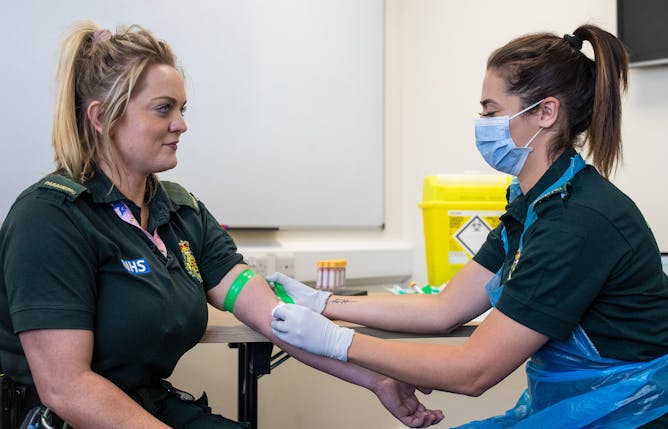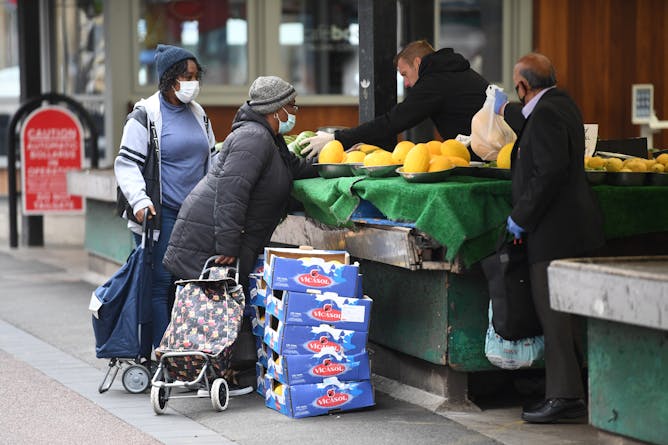|
|
|
|
It’s becoming increasingly clear that getting rid of COVID-19 will rely on people developing widespread immunity to the disease. From what we’ve seen so far, existing measures to reduce viral transmission don’t have the power to eliminate the coronavirus.
So it might seem like a low blow that antibodies against the virus seem to disappear quickly after infection. This is what a large new study has found, dampening hopes that long-lasting protection is possible.
But we shouldn’t give up hope. Antibodies are not the definitive answer on immunity. As Sheena Cruickshank explains, they are just one element of our immune response against the coronavirus, and we would expect them to fade naturally over time anyway. The key question is whether two other key parts of the response – T cells and B cells – also fade. If these don’t last, then neither will immunity. With so much still to find out, it’s too
early to give up on long-term immunity just yet.
When the government produces research on why ethnic minorities in the UK are worse off, you might expect it to consider the effects of racism. Yet the latest report from the Race Disparity Unit on why COVID-19 has affected minority groups worse than white people didn’t mention the potential impact of prejudice or discrimination once. In contrast, a new report by Labour peer Doreen Laurence has found structural racism has helped the coronavirus thrive among ethnic minority communities.
This might seem like yet another ideological battle over how to respond to inequality, but the data is clear. Differences in health outcomes cannot be explained away by where people live or the jobs they do. The evidence points to numerous ways that racism plays a role.
Also find out about how expanding marine protected areas could deliver higher fish yields – but only if done right.
|
Rob Reddick
Commissioning Editor, COVID-19
|

|
|

EPA-EFE
Sheena Cruickshank, University of Manchester
Antibody levels naturally fade – the key question is whether infected people sustain adequate levels of T cells and B cells.
|

Neil Hall/EPA
James Nazroo, University of Manchester; Laia Becares, University of Sussex
A new report on COVID-19 inequalities fails to mention racism.
|

Sweetlips shoal in the Raja Ampat marine protected area, Indonesia.
SergeUWPhoto/Shutterstock
Peter JS Jones, UCL; Rick Stafford, Bournemouth University
Most existing MPAs are in distant and largely empty waters. Expanding them where it counts will meet a lot of resistance.
|
Health + Medicine
|
-
Lawrence Goodridge, University of Guelph
Identifying the emergence of a disease often relies on sick people seeking medical help. Wastewater monitoring can identify pathogens days or weeks earlier.
-
Jennifer Windt, Monash University
Spontaneous thought, or mind wandering, occupies up to 50% of our time awake. In a time of COVID, the unruliness and unboundedness of our minds might be a great escape.
-
Louise Carson, Queen's University Belfast; Colin McCoy, Queen's University Belfast; Jessica Moore, Queen's University Belfast
Novel plastics can rid themselves of germs using only air and light.
|
|
Arts + Culture
|
-
Harriet Fletcher, Lancaster University
Series including Ratched and American Horror Story are sustaining the careers of some of Hollywood's most talented female stars.
-
Alec Charles, University of Winchester
Writers, actors and fans have been coming up with ways to keep audiences happy during the pandemic.
|
|
Politics + Society
|
-
Fay Sweeting, Bournemouth University
Research reveals how police officers abuse their position for sexual gain. While most are disciplined or dismissed, forces must do more to tackle the issue.
-
Richard Johnson, Queen Mary University of London
Turnout of American voters overseas is historically low – but every vote counts.
|
|
Business + Economy
|
-
Helen Devereux, Solent University
Little public attention has been paid to the seafarers working onboard the tanker who were caught up in the incident.
-
John Picton, University of Liverpool; John Tribe, University of Liverpool
Not only can directors be disqualified for 15 years, they can be made to pay for any costs they can even be made to compensate for failures out of their own pockets.
|
|
Science + Technology
|
-
Ellen Furlong, Illinois Wesleyan University
Dogs process the sensory world very differently than humans, but love in a way that is entirely familiar.
|
|
Cities
|
-
Philip Brown, University of Huddersfield
People told us about leaking roofs and guttering, and about how water coming into their housing had caused internal damage, damp and mould.
|
|
| |
Featured events
|

|
Swansea University , Singleton Park, Swansea, Swansea [Abertawe GB-ATA], SA3 3DX, United Kingdom of Great Britain and Northern Ireland — Swansea University
|

|
Belfield, Dublin, Dublin, D04 V1W8, Ireland — University College Dublin
|

|
Online (Oxford Martin School), Online, Oxfordshire, OX13BD, United Kingdom of Great Britain and Northern Ireland — University of Oxford
|

|
East Road, Cambridge, Cambridgeshire, CB11PT, United Kingdom of Great Britain and Northern Ireland — Anglia Ruskin University
|
|
|
|
| |
| |
| |
| |
| |
|
|
|
|
|
|
|